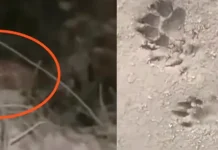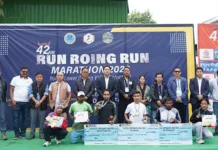[ Gijum Tali ]
Walking can be a great exercise, but walks on foot in the ’60s and the early ’70s were taken due to compulsion in the absence of means of communication in those days, and my passion for walking was infused in me by my mentor father, late Togi Tali, who expired on 1 November, 2021, after battling for life due to an ailment at the age of 91.
All the memorable walks with my father that linger bitter-sweetly in the corridors of my mind abruptly burst into emotions after his demise. This passion for walking is a legacy handed down to me by my father as I took it first long back as a seven-year-old child during my father’s transfer from Liromoba to Aalo in 1968, covering a distance of around 100 kms, negotiating the hostile foot tracks in the dense forest, searching for the shortest short-cuts from Liromoba to Aalo.
The most memorable and longest walk of my life unfolded in the year 1975, when I set out on foot with my father at the age of 14 years from Akajan to Aalo after buying a herd of cattle costing Rs 120 to Rs 250 each from nearby Akajan. We managed to reach Silapathar after the purchase by evening, and shopped for essential commodities for four-and-a-half days, including a pair of shoes for me. From that night onwards, it was a dawn to dusk journey for us and the waking time in the morning was the first crowing of the rooster. I was taken aback when my father told me that it would take four-and-a-half days to reach Aalo if we walked 40 percent of the short-cut jungle road and 60 percent of the undulating carpeted road. He encouraged me to keep the courage to walk on any surface. My father was a hunter right from his teens and had great navigation power in the jungle to locate any short-cut routes.
That walk was the most adventurous, fascinating, tiresome and closest association with my father as we slept, ate and gossiped together at a shoulder-rubbing distance, taking shelter in someone’s house, putting up in others’ granary and often temporary sheds.
There was fun, excitement, adventure, tiredmess, and a bit of risk, but all ended well. The walks in the jungle were more fascinating as we got plenty of fresh running water and jungle fruits available in plenty even after walking a few metres in those days to quench thirst and hunger. We would often sit in the cool canopy of shady trees and my father used to narrate stories and incidents like how he faced childhood adversities, how he walked from Monigong to Aalo thrice a month after joining service in 1952 as a dak-runner, how his sincerity in service forced him to join the Tagin war of 1953. My father made a startling revelation that he could have killed two Tagins who were found in a very tired condition close to him in the 1953 war in the dense jungle but avoided and escaped as it was a game of kill or get killed situation at that time. He told me that he had the courage the avoid the killing, otherwise he would have had to perform local ritual all through his life and offspring like myself would not have materialized due to the wrath involved in killing a human being.
The pair of shoes that my father bought for me at Silapathar was holed just after reaching Igo, the midway between Aalo and Silapathar, and another one which I wore from Aalo got holed again after reaching Darka village. I used my father’s chappal and father had to walk barefoot to reach our home in PI Colony, Aalo. The 15 cows that we brought to Aalo were quite safe, healthy and free from any leg sore as cows were feeding on fine jungle leaves and we avoided walking on the carpeted roads. A few people like us were seen putting pieces of chappals cut as shoes for the cows, and finding no alternative, limping cows with acute leg sores were cut, roasted and taken as meat by other buyers who took lengthy routes all along the carpeted roads.
Walking with my father in the night for fishing too was as tough as the longest walk of my life as we set on foot for fishing in the gloomy night after 8 pm only. It took me 3 kms from my village Gemo Tali to Keak and up to the riverbanks and from my residence in PI Colony to Sipu and the Yomgo river up to Ranaghat was tiresome and a bit horrible too. The walking in the river on slippery stones, negotiating the dead night up to 10 pm, depending on the catch, was quite tough as the torch we carried was never allowed to be used as it would allow the fishes accumulated in groups near the bank to run away. During vacation in my RK Mission School too I walked with my brother up to Gemo Tali village, covering a distance of 33 kms from Aalo in peak cultivation time when my parents were in the village paddy field, forgetting to pick us up in our vacation.
My father retired from service in 1992 after serving the government for 40 years, and coincidently, I was selected to serve as DIPRO. The communication was not linked fully in rural areas in the early ’90s too, and these experiences of walking with my father emboldened me to take all walks in my service life easily and Changlang to Khimiyong, a remote circle, on foot during my tenure at Changlang, three days of walks in the hostile terrain from Giba circle to Dasi, Kare, Sebing, Magria, Jeke and back to Daporijo with late Tadak Dulom, then minister, and Daklo Nidak, then MLA, again to the same destination during my tenure at Daporijo, Lumla to Burma Check gate via Blithing with DC KR Meena during my Tawang tenure are some of the long and memorable walks on foot undertaken by me in my service life too.
What I want to expose I hope is not a mere narrative of what I have done so far, but rather to share the parent-children relationship on the demise of my father recently. Leave a rich legacy to the next generation and keep children along with you to build up mutual trust, love and affection, and above all, take them along in the process of socialization, so that they know the values of struggle and adversities to fit themselves as key members of a given society to live in. (The writer is DIPRO, West Siang)


